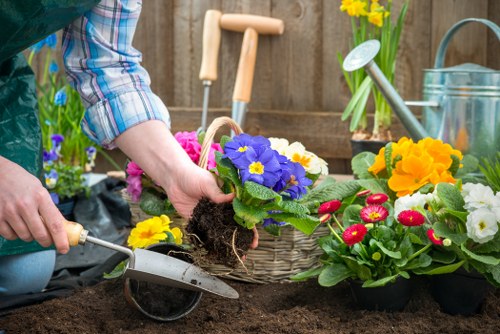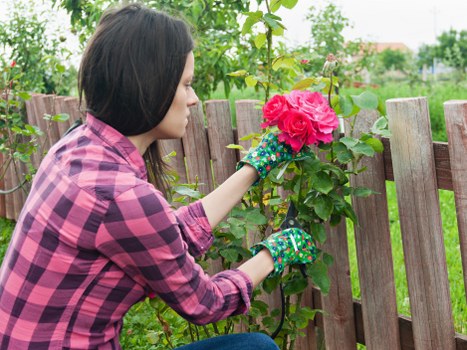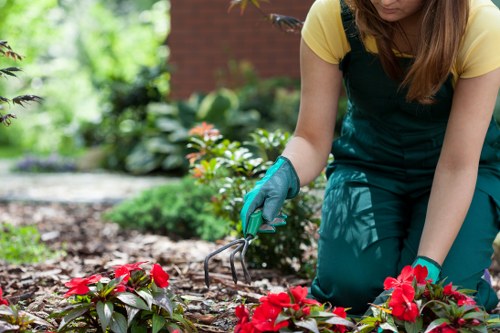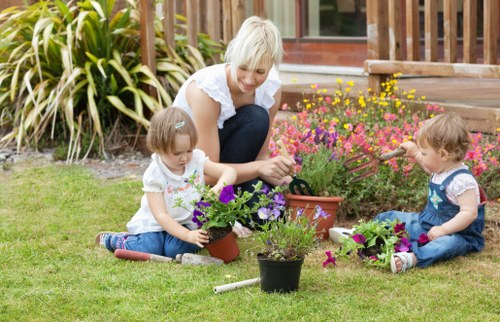Comprehensive Guide to Garden Fence Installation in Ware

Installing a garden fence is a crucial step in enhancing your home's privacy, security, and aesthetic appeal. In Ware, a town known for its beautiful gardens and historic charm, selecting the right garden fence can significantly impact the overall look and functionality of your outdoor space.
Choosing the appropriate materials, understanding local regulations, and knowing the best installation practices are essential for a successful garden fence project. This guide provides detailed insights into everything you need to know about garden fence installation in Ware.
Whether you're aiming to create a secluded garden retreat, keep pets and children safe, or simply add a decorative element to your property, this article covers all aspects of garden fence installation to help you make informed decisions.
Types of Garden Fences

When it comes to garden fences, there are various styles and materials to choose from, each offering different benefits and aesthetics. Understanding the options available can help you select the best fence for your specific needs and preferences.
Wooden Fences: Wooden fences are a popular choice due to their natural beauty and versatility. They can be customized with different stains or paints to match your garden's style.
Metal Fences: Metal fences, such as wrought iron or aluminum, provide durability and a classic look. They are low-maintenance and can add a touch of elegance to any garden.
Choosing the Right Material

Choosing the right material for your fence depends on various factors, including budget, desired aesthetic, and the level of maintenance you're willing to perform. Here are some common materials used in garden fence installation:
- PVC: Known for its durability and low maintenance, PVC fences are resistant to weather and pests.
- Vinyl: Similar to PVC, vinyl fences come in a wide range of colors and styles, making them versatile for different garden designs.
- Bamboo: For a more natural and eco-friendly option, bamboo fences offer a unique look and are sustainable.
Consider the climate in Ware and how each material performs under local weather conditions to ensure your fence stands the test of time.
Planning Your Fence Installation

Proper planning is essential for a successful garden fence installation. This involves measuring your garden boundaries, obtaining necessary permits, and ensuring compliance with local regulations.
Measuring Your Garden: Accurate measurements help determine the amount of materials needed and the overall cost of the project. It's advisable to mark the fence line clearly to avoid any disputes with neighbors.
Permits and Regulations: In Ware, certain types of fences may require permits, especially if they exceed a specific height or are placed near property lines. Contact your local council to understand the requirements before starting your installation.
Budgeting for Your Fence

Creating a budget is a crucial step in garden fence installation. Costs can vary widely based on the materials chosen, the length of the fence, and whether you hire a professional or undertake the project yourself.
Here are some factors to consider when budgeting:
- Material Costs: Different materials have varying price points. For example, wooden fences may be more affordable than metal ones.
- Labor Costs: Hiring professionals can ensure quality installation but will increase the overall cost.
- Additional Features: Decorative elements like lattice panels or gates can add to the cost but enhance the fence's functionality and appearance.
By carefully planning and considering these factors, you can create a realistic budget that meets your needs without compromising on quality.
Step-by-Step Installation Process

Installing a garden fence involves several steps, from preparing the site to the final touches. Here's a comprehensive guide to help you through the process:
- Preparation: Clear the area where the fence will be installed. Remove any debris, plants, or obstructions that may interfere with the installation.
- Marking the Fence Line: Use stakes and string to mark the exact path of the fence. Ensure that the line is straight and accurately follows your measurements.
- Setting Fence Posts: Dig holes for the fence posts at regular intervals, typically every 6 to 8 feet. Ensure the holes are deep enough to provide stability.
- Installing Panels: Attach the fence panels to the posts, making sure they are level and secure. For wooden fences, pre-drilling holes can prevent splitting.
- Adding Gates and Finishing Touches: Install gates as needed and add any decorative elements to complete the fence.
Following these steps carefully can help ensure a sturdy and attractive garden fence that lasts for years to come.
Tools and Equipment Needed

Having the right tools and equipment is essential for a smooth fence installation process. Here's a list of common tools you'll need:
- Measuring Tape: For accurate measurements of your garden boundaries and fence panels.
- Post Hole Digger: To dig holes for fence posts efficiently.
- Level: Ensures that fence posts and panels are straight and even.
- Screwdriver or Drill: For assembling and securing fence panels.
- Concrete Mixer: Optional but useful for setting posts firmly in place.
Investing in quality tools can make the installation process easier and result in a more professional-looking fence.
Maintenance Tips for Your Garden Fence

Regular maintenance is key to preserving the integrity and appearance of your garden fence. Different materials require different maintenance routines to ensure longevity.
Wooden Fences: These require periodic sealing or staining to protect against moisture and pests. Inspect the fence regularly for signs of rot or damage and address any issues promptly.
Metal Fences: While metal fences are generally low-maintenance, they should be checked for rust or corrosion, especially in humid climates. Applying a protective coating can help prevent deterioration.
Seasonal Maintenance Tasks

Maintaining your fence throughout the year involves specific tasks based on the season:
- Spring: Inspect the fence for any winter damage and perform necessary repairs. Clean the fence to remove dirt and debris accumulated over the winter months.
- Summer: Apply protective coatings like paint or sealant to wooden fences. Trim any overgrown plants that may cause damage to the fence structure.
- Fall: Prepare your fence for the winter by making sure it is sturdy and free from loose components. Clear any fallen leaves or branches that could trap moisture.
- Winter: Protect wooden fences from extreme cold by adding coverings if necessary. Avoid walking on the fence to prevent stress on the structure.
By adhering to these seasonal maintenance tasks, you can extend the lifespan of your garden fence and keep it looking its best year-round.
Benefits of Installing a Garden Fence

Installing a garden fence offers numerous benefits that enhance both the functionality and beauty of your outdoor space. Here are some of the key advantages:
- Privacy: A fence provides a barrier that increases privacy, allowing you to enjoy your garden without prying eyes from neighbors or passersby.
- Security: A sturdy fence can help deter intruders and keep pets and children safe within your property.
- Property Definition: Clearly defining your property boundaries can prevent disputes with neighbors and create a sense of ownership.
- Aesthetic Appeal: A well-designed fence can enhance the overall look of your garden, adding character and charm to your home.
- Wind Protection: In windy areas, a fence can act as a windbreak, protecting plants and making your garden more comfortable.
Enhancing Curb Appeal

A beautiful garden fence can significantly boost your home's curb appeal, making it more attractive to visitors and potential buyers. Choosing a style that complements your home's architecture and the surrounding landscape can create a harmonious and inviting atmosphere.
Consider incorporating decorative elements such as lattice panels, ornamental posts, or unique paint colors to add a personal touch to your fence. This not only enhances the visual appeal but also reflects your individual style and taste.
Choosing a Professional Installer vs. DIY

Deciding whether to hire a professional fence installer or undertake the project yourself is an important consideration. Both options have their advantages and challenges.
Professional Installation: Hiring experts ensures that the fence is installed correctly and efficiently. Professionals have the necessary tools and experience to handle unexpected issues and comply with local regulations.
DIY Installation: If you have the skills and time, installing the fence yourself can save money. DIY projects also allow for greater control over the design and materials used.
Factors to Consider

When deciding between professional installation and DIY, consider the following factors:
- Skill Level: Assess your ability to handle the installation process. Complex projects may require professional expertise.
- Time Commitment: DIY projects can be time-consuming, especially for larger fences. Ensure you have the availability to complete the project without undue stress.
- Budget: While DIY can save on labor costs, consider the potential for mistakes that may incur additional expenses.
- Regulations: Professionals are typically well-versed in local regulations and can ensure your fence complies with all requirements.
Weighing these factors will help you make an informed decision that aligns with your goals and resources.
Local Regulations and Permits in Ware

Before installing a garden fence in Ware, it's essential to understand the local regulations and obtain the necessary permits. Compliance with these rules ensures that your fence meets all safety and aesthetic standards set by the community.
The town of Ware has specific guidelines regarding fence heights, materials, and placement. Typically, residential fences are limited to a certain height, and some materials may be restricted to maintain the area's historic character.
Contact the Ware Borough Council or visit their official website to obtain detailed information on fence regulations. They can provide guidance on permit applications, any required inspections, and potential restrictions based on your property's location.
Common Permit Requirements

When applying for a fence permit in Ware, be prepared to provide the following:
- Property Map: A detailed map indicating the fence location relative to property lines.
- Fence Design: Plans or drawings showcasing the design, materials, and dimensions of the proposed fence.
- Neighbor Agreements: In some cases, obtaining consent from adjacent property owners may be required.
- Compliance Statement: A declaration that the fence will adhere to all local regulations and standards.
Ensuring that all necessary documentation is prepared in advance can streamline the permit approval process and prevent delays.
Eco-Friendly Fence Options

For environmentally conscious homeowners in Ware, eco-friendly fence options offer sustainable alternatives that reduce environmental impact while still providing functionality and beauty.
Recycled Materials: Fences made from recycled wood, metal, or plastic help reduce waste and lower the demand for new raw materials.
Sustainable Wood: Using wood from sustainably managed forests ensures that your fence is environmentally responsible and supports conservation efforts.
Benefits of Eco-Friendly Fences

Choosing eco-friendly fencing materials offers several benefits:
- Reduced Carbon Footprint: Sustainable materials often require less energy to produce and transport, lowering your fence's overall carbon impact.
- Longevity: Eco-friendly materials are typically durable and long-lasting, minimizing the need for frequent replacements.
- Natural Aesthetics: Sustainable materials often blend seamlessly with natural surroundings, enhancing the garden's beauty.
- Health Benefits: Materials with low or no volatile organic compounds (VOCs) contribute to a healthier environment for you and your family.
By opting for eco-friendly fence options, you contribute to environmental sustainability while enjoying a beautiful and functional garden fence.
Top 10-15 Nearby Areas to Ware for Garden Fence Installation

Ware is surrounded by several charming areas that also benefit from quality garden fence installations. Here are the top nearby areas to consider:
- Bishop's Stortford: Just a few miles from Ware, known for its vibrant community and beautiful parks.
- St Albans: Renowned for its historical architecture and lush gardens, perfect for stylish fence installations.
- Broxbourne: A family-friendly area with spacious properties ideal for robust fencing solutions.
- Ashwell: Offers a serene rural setting, making traditional wooden fences a popular choice.
- Sandon: Known for its picturesque landscapes, eco-friendly fences complement the natural beauty.
- Little Amwell: A quaint village where customized fences can enhance the local charm.
- Great Amwell: Similar to Little Amwell with a focus on sustainable fencing options.
- Braughing: Combines history with modern living, allowing for a mix of classic and contemporary fence styles.
- Stevenage: A larger town nearby offering a variety of fencing materials and styles to suit diverse preferences.
- Harpenden: Close to Ware, known for its affluent neighborhoods where premium fences are in demand.
- Knebworth: Offers a mix of traditional and modern fencing needs, perfect for versatile installations.
- Royston: A growing area where durable and low-maintenance fences are highly sought after.
- Huntingdon: Slightly further away but still relevant, especially for custom and large-scale fence projects.
- Welwyn Garden City: Known for its planned layouts, coherent fence styles are popular here.
- Waltham Cross: Diverse housing requiring a range of fencing solutions from decorative to secure.
Choosing the Right Fence Style for Your Area

Selecting a fence style that complements your specific area in Ware or its nearby regions can enhance both functionality and aesthetics. Consider the following popular styles:
- Picket Fences: Ideal for traditional gardens, offering a charming and classic look.
- Privacy Fences: Perfect for homeowners seeking maximum privacy and security.
- Lattice Fences: Provide partial privacy while allowing light and air to flow through, suitable for decorative purposes.
- Security Fences: Designed to deter intruders with taller heights and stronger materials.
- Ornamental Fences: Focus on decorative elements, adding unique character to your garden.
Assess your specific needs, preferences, and the characteristics of your area to choose the most suitable fence style.
Integrating Fences with Garden Design

A well-integrated fence can seamlessly blend with your garden design, enhancing the overall landscape. Here are some tips for integration:
- Matching Materials: Use materials that complement existing structures and plantings in your garden.
- Color Coordination: Choose paint or stain colors that harmonize with your home's exterior and garden elements.
- Height Considerations: Ensure the fence height aligns with the scale of your garden and surrounding properties.
- Decorative Features: Incorporate elements like trellises, arches, or decorative posts to add visual interest.
Thoughtful integration of your fence with the garden design creates a cohesive and attractive outdoor space.
Maximizing the Lifespan of Your Fence

To ensure your garden fence remains in excellent condition for years, it's important to take proactive measures to protect and maintain it. Here are some strategies to maximize the lifespan of your fence:
Regular Inspections: Periodically check your fence for any signs of wear, damage, or pest infestations. Early detection allows for timely repairs and prevents minor issues from escalating.
Protective Coatings: Apply weather-resistant coatings, such as paint or sealant, to protect your fence from the elements. This is especially important for wooden and metal fences that are exposed to moisture and varying temperatures.
Addressing Common Issues

Being aware of common fence issues and addressing them promptly can extend the life of your fence:
- Rot and Decay: For wooden fences, rot is a common problem caused by moisture. Replace any rotten sections and ensure proper drainage around the fence.
- Rust and Corrosion: Metal fences may develop rust over time. Use rust-resistant paint or treatments to prevent corrosion.
- Loose or Broken Panels: Secure any loose panels and replace broken parts to maintain the fence's structural integrity.
- Pest Damage: Inspect for signs of pests, such as termites or carpenter bees, and treat infestations accordingly.
Regular maintenance and prompt repairs can keep your fence looking and functioning well for many years.
Innovative Fence Technologies

Advancements in fencing technology offer new options that enhance the functionality and convenience of garden fences. Here are some innovative technologies to consider:
Smart Fencing: Incorporates sensors and connected devices to monitor fence integrity, detect intrusions, and integrate with home automation systems.
Vinyl Composite Fencing: Combines the durability of vinyl with the natural appearance of wood, offering a maintenance-free and eco-friendly alternative.
Benefits of Modern Technologies

Integrating modern technologies into your garden fence can provide several benefits:
- Enhanced Security: Smart fences can alert you to potential threats, providing an added layer of security.
- Ease of Maintenance: Innovative materials like vinyl composites require less maintenance while maintaining aesthetic appeal.
- Customization: Modern technologies offer customizable solutions that can be tailored to your specific needs and preferences.
- Sustainability: Eco-friendly materials and technologies contribute to a more sustainable and environmentally responsible garden.
Exploring these advanced options can help you achieve a more efficient and stylish garden fence.
Cost Considerations for Garden Fence Installation

Understanding the various cost factors involved in garden fence installation can help you manage your budget effectively. Here are the main cost components to consider:
- Materials: The type and quality of materials chosen directly impact the overall cost.
- Labor: Professional installation costs vary based on the complexity and size of the project.
- Permits: Obtaining necessary permits may involve fees, depending on local regulations.
- Accessories: Gates, decorative elements, and additional features add to the total expense.
- Maintenance: Ongoing maintenance costs should be factored into your budget to ensure long-term durability.
By carefully assessing these factors, you can plan your budget to accommodate both initial installation and future maintenance needs.
Cost-Saving Tips

Here are some tips to help you save on garden fence installation costs without compromising quality:
- Choose Cost-Effective Materials: Opt for materials that offer durability and aesthetics at a reasonable price, such as treated lumber or vinyl.
- DIY Installation: If you have the skills, installing the fence yourself can significantly reduce labor costs.
- Plan Ahead: Careful planning and accurate measurements can prevent overbuying or underestimating material needs.
- Purchase in Bulk: Buying materials in bulk can lead to discounts and lower overall costs.
- Recycled Materials: Consider using recycled or reclaimed materials for a cost-effective and eco-friendly fence.
Implementing these strategies can help you achieve a beautiful garden fence while staying within your budget.
Conclusion

Installing a garden fence in Ware involves careful consideration of materials, design, local regulations, and maintenance. By understanding the various options and planning thoroughly, you can create a fence that enhances your garden's beauty, provides security, and adds value to your property.
Whether you choose to hire professionals or embark on a DIY project, prioritizing quality and sustainability will ensure your garden fence remains a valuable asset for years to come.
Frequently Asked Questions

1. Do I need a permit to install a garden fence in Ware?
In Ware, some types of fences may require permits, especially if they exceed a specific height or are near property lines. It's best to contact the Ware Borough Council to determine if your project requires a permit.
2. What is the most durable material for a garden fence?
Materials like metal (wrought iron, aluminum) and vinyl composites are known for their durability. They resist weather damage and require minimal maintenance compared to wood.
3. How long does it take to install a garden fence?
The installation time varies based on the fence's length, material, and complexity. On average, a professional installation may take a few days, while a DIY project could take longer depending on your experience and availability.
4. Can I install a garden fence myself?
Yes, if you have the necessary skills and tools, you can install a garden fence yourself. However, for larger or more complex projects, hiring a professional may ensure better results and compliance with local regulations.
5. How do I maintain my garden fence?
Regular maintenance includes inspecting for damage, applying protective coatings, cleaning, and addressing any issues promptly. The specific maintenance tasks depend on the fence material, such as sealing wood or treating metal to prevent rust.